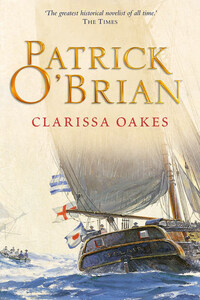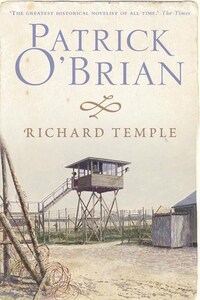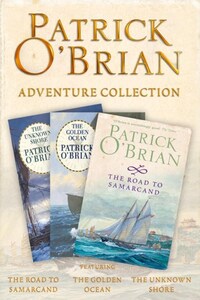The sails of a square-rigged ship, hung out to dry in a calm.
1 Flying jib
2 Jib
3 Fore topmast staysail
4 Fore staysail
5 Foresail, or course
6 Fore topsail
7 Fore topgallant
8 Mainstaysail
9 Main topmast staysail
10 Middle staysail
11 Main topgallant staysail
12 Mainsail, or course
13 Maintopsail
14 Main topgallant
15 Mizzen staysail
16 Mizzen topmast staysail
17 Mizzen topgallant staysail
18 Mizzen sail
19 Spanker
20 Mizzen topsail
21 Mizzen topgallant
Illustration source: Serres, Liber Nauticus. Courtesy of The Science and Technology Research Center, The New York Public Library, Astor, Lenox, and Tilden Foundation
Chapter One
Standing at the frigateâs taffrail, and indeed leaning upon it, Jack Aubrey considered her wake, stretching away neither very far nor emphatically over the smooth pure green-blue sea: a creditable furrow, however, in these light airs. She had just come about, with her larboard tacks aboard, and as he expected her wake showed that curious nick where, when the sheets were hauled aft, tallied and belayed, she made a little wanton gripe whatever the helmsman might do.
He knew the Surprise better than any other ship he had served in: he had been laid across a gun in the cabin just below him and beaten for misconduct when he was a midshipman, and as her captain he too had used brute force to teach reefers the difference between naval right and naval wrong. He had served in her for many years, and he loved her even more than his first command: it was not so much as a man-of-war, a fighting-machine, that he loved her, for even when he first set foot aboard so long ago neither her size nor her force had been in any way remarkable, and now that the war had been going on for twenty years and more, now that the usual frigate carried thirty-eight or thirty-six eighteen-pounders and gauged a thousand tons, the Surprise, with her twenty-eight nine-pounders and her less than six hundred tons, had been left far behind; in fact she and the rest of her class had been sold out of the service or broken up and not one remained in commission, although both French and American yards were building fast, shockingly fast: no, it was primarily as a ship that he loved her, a fast, eminently responsive ship that, well handled, could outsail any square-rigged vessel he had ever seen, above all on a bowline. She had also repaired his shattered fortunes when they were both out of the Navy â himself struck off the list and she sold at the block â and he sailed her as a letter of marque; but although that may have added a certain immediate fervour to his love, its true basis was a disinterested delight in her sailing and all those innumerable traits that make up the character of a ship. Furthermore, he was now her owner as well as her captain, for Stephen Maturin, the frigateâs surgeon, who bought her when she was put up for sale, had recently agreed to let him have her. And what was of even greater importance, both man and ship were back in the Navy, Jack Aubrey reinstated after an exceptionally brilliant cutting-out expedition (and after his election to Parliament), and the frigate as His Majestyâs hired vessel Surprise â not quite a full reinstatement for her, but near enough for present happiness.
Her first task in this particular voyage had been to carry Aubrey and Maturin, who was an intelligence-agent as well as a medical man, to the west coast of South America, there to frustrate French attempts at forming an alliance with the Peruvians and Chileans who led the movement for independence from Spain and to transfer their affections to England. Yet since Spain was then at least nominally allied to Great Britain the enterprise had to be carried out under the cover of privateering, of attacking United States South-Sea whalers and merchantmen and any French vessels she might chance to meet in the east Pacific. This plan had been betrayed by a highly-placed, a very highly-placed but as yet unidentified traitor in Whitehall, and it had had to be postponed, Aubrey and Maturin going off on quite a different mission in the South China Sea, eventually keeping a discreet rendezvous with the Surprise on the other side of the world, in about 4°N and 127°E, at the mouth of the Salibabu Passage, the frigate in the meantime having been commanded by Tom Pullings, Jackâs first lieutenant, and manned, of course, by her old privateering crew. Here they sent her more recent prizes away for Canton under the escort of The Nutmeg of Consolation, a charming little post-ship lent to Captain Aubrey by the Lieutenant-Governor of Java, and so proceeded to New South Wales, to Sydney Cove itself, where Jack hoped to have his stores renewed and several important repairs carried out against their eastward voyage to South America and beyond, and where Stephen Maturin hoped to see the natural wonders of the Antipodes, particularly Ornithorhynchus paradoxus, the duck-billed platypus.










